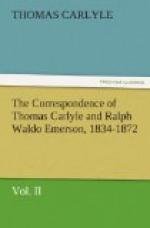Miss Fuller came duly as you announced; was welcomed for your sake and her own. A high-soaring, clear, enthusiast soul; in whose speech there is much of all that one wants to find in speech. A sharp, subtle intellect too; and less of that shoreless Asiatic dreaminess than I have sometimes met with in her writings. We liked one another very well, I think, and the Springs too were favorites. But, on the whole, it could not be concealed, least of all from the sharp female intellect, that this Carlyle was a dreadfully heterodox, not to say a dreadfully savage fellow, at heart; believing no syllable of all that Gospel of Fraternity, Benevolence, and new Heaven-on-Earth, preached forth by all manner of “advanced” creatures, from George Sand to Elihu Burritt, in these days; that in fact the said Carlyle not only disbelieved all that, but treated it as poisonous cant,—sweetness of sugar-of-lead,—a detestable phosphorescence from the dead body of a Christianity, that would not admit itself to be dead, and lie buried with all its unspeakable putrescences, as a venerable dead one ought!—Surely detestable enough.—To all which Margaret listened with much good nature; though of course with sad reflections not a few.*—She is coming back to us, she promises. Her dialect is very vernacular,—extremely exotic in the London climate. If she do not gravitate too irresistibly towards that class of New-Era people (which includes whatsoever we have of prurient, esurient, morbid, flimsy, and in fact pitiable and unprofitable, and is at a sad discount among men of sense), she may get into good tracks of inquiry and connection here, and be very useful to herself and others. I could not show her Alfred (he has been here since)




